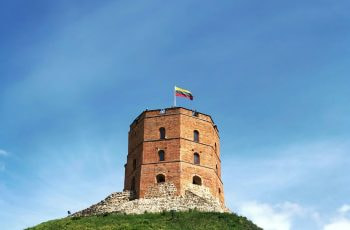Lithuanian Authority Seeks Enforcement Powers
The Lithuanian Gambling Supervisory Authority is going to lobby the Vilnius Regional Administrative Court for the power to block access and payments. The regulatory authority is attempting to gain these powers in a bid to tackle unlicensed gambling sites as it looks to step up efforts to counteract illegal gambling

iGaming has become increasingly popular in Lithuania. The regulatory authority is therefore looking to acquire new powers in order to protect players from unlicensed operators. ?besteonlinecasinos/Pixabay
If the regulator is indeed granted these powers, it will be able to issue legally binding orders to have internet service providers (ISPs) block the unlicensed sites. It will also be able to force payment processing companies to cease all transactions with such businesses.
The Lithuanian Gambling Supervisory Authority would be elevated to the level of the Lithuanian Radio and Television Commission (LRTK) should these powers be granted. The LRTK can already order ISPs to prevent Lithuanian citizens from accessing illegal content. This power was granted under the Public Information and the Copyright and Related Acts.
The regulator already has the ability to take measures against illegal operators through the creation of an online gaming blacklist. This power was granted under the Law on Gambling of the Republic of Lithuania. The blacklist currently includes 354 domains, which include sites operated by Kindred Group, The Stars Group, bet365 and, Flutter entertainment.
The authority does not currently have the power to block these sites. For this to happen, the authority needs to have a blocking order approved by the Vilnius Court. The authority is looking to have the power to block the sites itself, to streamline this process.
The authority has recently warned licensees to block transactions from customers made using payment details which have not previously been verified as linked to the player in question. The operators must verify that a debit or credit card is in the player’s name before accepting deposits from their account.
Lithuanian iGaming Revenue Grew to €17.5m
These regulatory powers are being sought after the revenue for online gaming was released in August. In the first six months of 2019, the revenue in the regulated market from iGaming sources rose to €17.5m.
Remote betting was the main source of income for licensed operators in the country. Revenue rose from €8.1m to €10.4m. The Lithuanian Ministry of Finance released these figures and six sports betting operators were active in the country during this period.
Online casino revenue also rose in this period, from €3.8m to €6.4m from the 1st of January 2019 to the 30th of June. There were again just six operators active in this section of the market.
In total, Lithuanian players spent €271.7m on iGaming in the six-month period, which was up from €255.6m last year. €254.2m was won by players.
Land-based gambling revenue also saw an increase, from €33.7m in the first six months of 2018, to €34.6m over the corresponding period this year.
Category B games were responsible for €15.5m of the total revenue, which again grew. This revenue increased from €15.2m last year, to €15.5m this year. Category B gambling games also generated €5.8m, compared to €5.3m in 2018. The Ministry of Finance did not make it clear which gambling games were included in each category.
Such increases in online gambling has increased the pressure on the regulatory authority to tackle illegal operators as the lucrative nature of the market encourages unlicensed operators to capitalize on it.
iGaming on the Rise
Online gambling participation rates almost doubled in Lithuania from 2017 to 2019, a recent research study claimed. The study was commissioned by the Lithuanian Gambling Supervisory Authority, and showed that whilst iGaming participation grew, the overall number of people gambling in the country fell.
The study was carried out by the market research firm Vilmorus under the instruction of Lithuania’s Ministry of Finance, as well as the gambling authority. In the study, the firm spoke to a total of 1,001 people.
The study showed that 10% of those who took part had gambled, which was down from 13% when a study of similar magnitude was carried out in 2017. It was also found that those aged under 29 were more likely to gamble than older age groups.
Despite this decline, it was found that there was a significant increase in the number of people gambling online. The figure increased from 16% in 2017 to 30% in the recent study.
This increase is supported by the figures released by the Ministry of Finance in August which showed that online gambling revenue in the Lithuanian market had increased by 41.8% to €17.5m in the first six months of 2019.
The findings of the study also included things such as 71% of those surveyed saying that advertising had an impact on their decision to gamble. This was down from 74% in 2017. This will likely change more over the coming years as the government has approved the introduction of new laws which will apply stricter regulations for gambling advertising on operators.
The findings of the study are again a factor is why the regulator is seeking these new powers. The increase in online gambling participation and revenue means that more unlicensed operators will be looking to tap into this market. As such, the Lithuanian Gambling Supervisory Authority feels it needs appropriate powers to protect consumers in Lithuania.
 Online Casinos UK
Online Casinos UK



